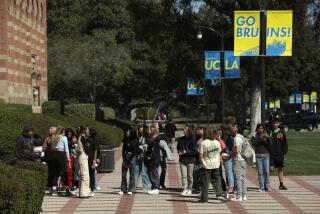UCLA math star Terence Tao wins $3-million prize
- Share via
UCLA mathematics professor Terence Tao already has a bevy of prestigious awards for his work in such fields as number theory and harmonic analysis. Now he is adding one more lucrative prize.
Tao, 38, has been named one of five winners of the new Breakthrough Prize in Mathematics, an award that provides $3 million to each of its recipients from a fund established by high-tech titans in Silicon Valley and Russia.
In 2006, he won the Fields Medal, described as the Nobel Prize of math, and also a $500,000 MacArthur Foundation grant, which is often referred to as the “genius prize.”
Born and raised in Australia, the son of a pediatrician and a former math teacher, Tao was a child prodigy. He earned his bachelor’s degree at the age of 16 and finished his doctorate at Princeton University at 21. He quickly joined UCLA’s faculty and, in what academics described as an astonishing achievement, became a full, tenured professor at 24. Colleagues nicknamed him “the Mozart of Math.”
Tao said he may use some of the Breakthrough award to support open access journals or online research collaborations, according to a UCLA announcement.
In a 2006 interview with the Times, Tao said that a lot of mathematicians liken what they do to rock climbing.
“You want to get to the top of the cliff. But that’s not what you focus on immediately. You focus on the next ledge just beyond your reach, because you need to do one clever thing to get up there. And then once you get there, you do it again. A lot of this is rather boring and not very glamorous. But you can’t jump cliffs in a single bound.”
The Breakthrough Prize in Math was established by Facebook founder Mark Zuckerberg and Russian tech mogul Yuri Milner. Related prizes in physics and life sciences also have been set up recently, with money from them and other wealthy figures in the tech fields.
The other four winners of the new math prize are Simon Donaldson of Stony Brook University in New York and Imperial College London, Maxim Kontsevich of the Institut des Hautes Études Scientifiques in France, Jacob Lurie of Harvard, and Richard Taylor of the Institute for Advanced Study in New Jersey.
More to Read
Sign up for Essential California
The most important California stories and recommendations in your inbox every morning.
You may occasionally receive promotional content from the Los Angeles Times.














